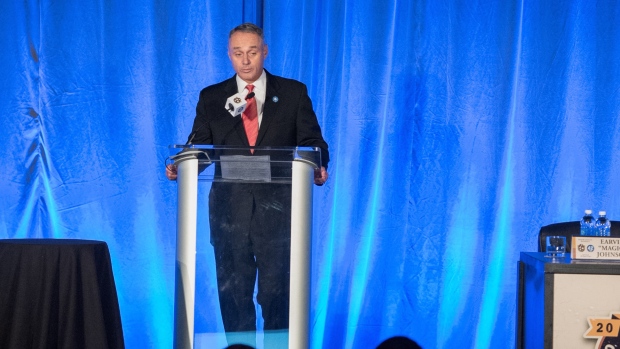Apr 23, 2015
MLB Commissioner hopes for exhibitions in Cuba during spring training 2016
Following President Barack Obama's announcement in December that he would restore diplomatic relations with Cuba, the new baseball commissioner hopes his sport can assist in improving ties in the same manner the U.S. table tennis team did during its 1971 trip to China — so-called "pingpong diplomacy."
The Canadian Press

NEW YORK, N.Y. - Rob Manfred believes Major League Baseball can engage in some fastball diplomacy.
Following President Barack Obama's announcement in December that he would restore diplomatic relations with Cuba, the new baseball commissioner hopes his sport can assist in improving ties in the same manner the U.S. table tennis team did during its 1971 trip to China — so-called "pingpong diplomacy."
"I can envision us playing games in Cuba," Manfred told the Associated Press Sports Editors on Thursday. "I'm hopeful that the situation in terms of actual changes in federal policy clarifies in time to put us in a position to play some exhibition games in Cuba next spring."
"I think that's the most likely starting place for us. We've made clear to the U.S. government that we are more than willing to play a role at a time that in their view is appropriate, and we think Cuba presents some really interesting possibilities for us going forward over the longer term," he said.
Following the overthrow of President Fulgencio Batista's government by Fidel Castro's forces at the end of 1958, the Los Angeles Dodgers and Cincinnati Reds met in March 1959 in what would be the last game between major league teams in Cuba in four decades.
The Orioles and Cuba's national team played a two-game series in 1999 in Havana and Baltimore.
Cuban players in the major leagues have increased in recent years, many of them defectors. There were 74 players under major and minor league contracts on opening day, up from 29 in 2008.
In order to become free agents rather than be subject to a draft, the Cubans establish residency in a third country.
Because of the American trade embargo, a player who defects from Cuba has to obtain a license from the U.S. Treasury Department's Office of Foreign Assets Control to "unblock" him before he can sign with a major league organization.
"We've been in ongoing conversations with OFAC and other relevant federal agencies about trying to figure out if there's a more regularized set of rules that can be used for Cuban players, maybe even rules that would allow them to play here and return to Cuba," Manfred said.
"Obviously, that implicates important federal policies that apply to businesses other than Major League Baseball. Our goal is to follow the lead of the federal government as this policy evolves and, hopefully, get to a situation where we have freer access to talent from Cuba."
Corruption has been a problem. Two men pleaded guilty in federal court in Miami last year for their roles in smuggling players out of Cuba, among then Yasiel Puig, Leonys Martin and Aldemys Diaz, in exchange for portions of the players' eventual contracts.
"It is very difficult for us to take responsibility for controlling what goes on prior to the establishment of residency, because we usually are not involved with the player or with the process by which the player gets out," Manfred said.
"It concerns us that there have been allegations of either unethical or illegal conduct. You have a fair amount of powers as the commissioner of baseball, but enforcing laws across international borders on human trafficking is sort of outside the ambit of those powers," he said.
Following contracts of more than $60 million for Rusney Castillo, Yasmany Tomas and Jose Abreu, and teams far exceeding their international signing bonuses pools to sign international free agents under 23, Manfred said in preparation for collective bargaining clubs are considering about again trying to obtain agreement for an international draft.
Baseball's five-year labour deal, which runs through the 2016, includes penalties for teams that spend big for players both in the amateur draft — who reside in the United States, Puerto Rico and Canada — and those with residence in other nations.
No team has exceeded their amateur draft pool by more than 5 per cent, but Arizona, Boston, the Los Angeles Angels, the New York Yankees and Tampa Bay have gone over their international pools by more than 15 per cent in the current signing period. As penalties, those teams can't sign any international players subject to the pool to signing bonuses over $300,000 during the next two signing periods, which start each July 2.
"I think I would have told you two years ago that the changes that we made in the international signing area in 2012 ... had worked pretty well," Manfred said. "Unfortunately, the stressor of a tremendous amount of talent becoming available in Cuba has shown that system to be wanting. So it would not surprise me if the clubs are desirous of moving to an international draft," he said.
"I've always thought that there's a single appeal to having a single method of entry, whether it's one draft, two drafts — if everybody comes into the game through a draft," he said.

